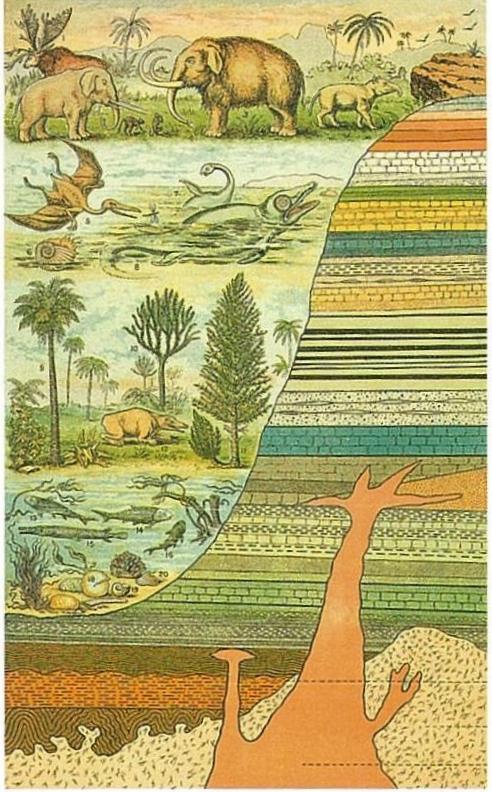~ The Study of Threes ~
http://threesology.org
This page is a companion to the following links:
- Evolutionary 3s page A
- Evolutionary 3s page B
- Evolutionary 3s page C
- Evolutionary 3s page D
- Evolutionary 3s page E

This print, published in 1880, illustrates the formation of rocks and the evolution of life on Earth. Before Darwin had even begun to write about evolution, the Philosopher Schelling had proposed his philosophy of Nature in which he explained nature as an ongoing process. The image and related comment are from Bryan Magee's "The Story of Thought, ISBN 0-7894-4455-0". Friedrich Wilhelm Joseph von Schelling First published Mon Oct 22, 2001; substantive revision Fri Oct 15, 2010 Friedrich Wilhelm Joseph von Schelling (1775–1854) is, along with J.G. Fichte and G.W.F. Hegel, one of the three most influential thinkers in the tradition of ‘German Idealism’. Although he is often regarded as a philosophical Proteus who changed his conception so radically and so often that it is hard to attribute one clear philosophical conception to him, Schelling was in fact often an impressively rigorous logical thinker. In the era during which Schelling was writing, so much was changing in philosophy that a stable, fixed point of view was as likely to lead to a failure to grasp important new developments as it was to lead to a defensible philosophical system. Schelling's continuing importance today relates mainly to three aspects of his work. The first is his Naturphilosophie, which, although its empirical claims are largely indefensible, opens up the possibility of a modern hermeneutic view of nature that does not restrict nature's significance to what can be established about it in scientific terms. The second is his anti-Cartesian account of subjectivity, which prefigures some of the best ideas of thinkers like Nietzsche, Heidegger, and Jacques Lacan, in showing how the thinking subject cannot be fully transparent to itself. The third is his later critique of Hegelian Idealism, which influenced Kierkegaard, Marx, Nietzsche, Heidegger, and others, and aspects of which are still echoed in contemporary thought by thinkers like Jacques Derrida. http://plato.stanford.edu/entries/schelling/ |
Here's a review of the history of Evolution:
Internet Encyclopedia of Philsophy
http://www.iep.utm.edu/evolutio/
Here's another link that may be of service: The Virtual Library- Evolutionary Philosophy Links
http://evolutionary-philosophy.net/library.html
There are many kinds, forms and types of Evolution. Not all of which are labeled "Evolution." Some may prefer to use the words change, mature, develop, adapt, alter, improve, etc... Others may not feel or think that a circumstance (such as an historical lineage) represents an evolutionary trek, since they define the word "Evolution" solely in terms of a Darwinian perspective. They refuse to use the word in the context of a broader application.
Your Questions, Comments or Additional Information are welcomed:
Herb O. Buckland
herbobuckland@hotmail.com